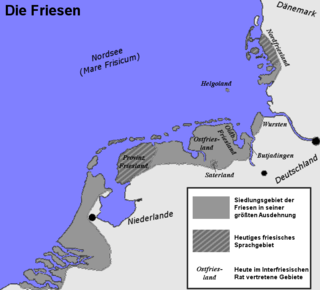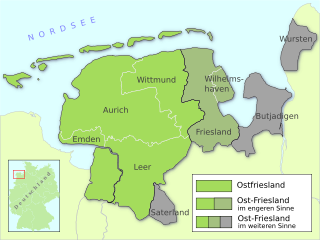This page is based on this
Wikipedia article Text is available under the
CC BY-SA 4.0 license; additional terms may apply.
Images, videos and audio are available under their respective licenses.

The Frisian languages are a closely related group of Germanic languages, spoken by about 500,000 Frisian people, who live on the southern fringes of the North Sea in the Netherlands and Germany. The Frisian languages are the closest living language group to the Anglic languages; the two groups make up the Anglo-Frisian languages group. However, modern English and Frisian are not mutually intelligible, nor are Frisian languages intelligible among themselves, due to independent linguistic innovations and foreign influences.
Frisian usually refers to:

The Frisians are a Germanic ethnic group indigenous to the coastal parts of the Netherlands and northwestern Germany. They inhabit an area known as Frisia and are concentrated in the Dutch provinces of Friesland and Groningen and, in Germany, East Frisia and North Frisia. The Frisian languages are still spoken by more than 500,000 people; West Frisian is officially recognized in the Netherlands, and North Frisian and Saterland Frisian are recognized as regional languages in Germany.

Frisia is a coastal region along the southeastern corner of the North Sea in what today is mostly a large part of the Netherlands, including modern Friesland and smaller parts of northern Germany. Frisia is the traditional homeland of the Frisians, a Germanic people that speaks Frisian languages, which together with English and Scots form the Anglo-Frisian language group.
East Frisian Low German or East Frisian Low Saxon is one of the Northern Low Saxon dialects, a West Low German dialect spoken in the East Frisian peninsula of northwestern Lower Saxony. It is used quite frequently in everyday speech there. About half of the East Frisian population in the coastal region uses Plattdüütsk. A number of individuals, despite not being active speakers of Low Saxon, are able to understand it to some extent. However, both active and passive language skills are in a state of decrease.
ISO 3166-2:NL is the entry for the Netherlands in ISO 3166-2, part of the ISO 3166 standard published by the International Organization for Standardization (ISO), which defines codes for the names of the principal subdivisions of all countries coded in ISO 3166-1.

West Frisian, or simply Frisian is a West Germanic language spoken mostly in the province of Friesland in the north of the Netherlands, mostly by those of Frisian ancestry. It is the most widely spoken of the three Frisian languages.
Frisian language may refer to:
East Frisian language may refer to:

The Anglo-Frisian languages are the West Germanic languages which include Anglic and Frisian.
East Frisian is an adjective referring to East Frisia, a region in Germany. It can refer specifically to:

East Frisians are, in the wider sense, the inhabitants of East Frisia in the northwest of the German state of Lower Saxony. In the narrower sense the East Frisians are the eastern branch of the Frisians, a Germanic people and belong, together with the Danes, Sorbs, Sinti and Romanies to the recognised minorities in Germany. They are closely related to the Saterland Frisians, who come from East Frisia and moved from the coastal region to the interior. The East Frisians are also related to the North Frisians and the Westlauwers Frisians.
The West Frisians – or, more precisely, the Westlauwers Frisians – are those Frisian peoples in that part of Frisia administered by the Netherlands: the Province of Friesland, which is bounded in the west by the IJsselmeer and in the east by the River Lauwers.

The Saterland Frisians are one of the smallest language groups in Europe. They belong to the eastern branch of the Frisian people and are thus a recognised minority within Germany. They live in the Saterland, a community in the northern part of Cloppenburg district.

The East Frisian Peninsula refers to the North Sea coastal region of Germany between the bays of Dollart and Jade. It is distinct from East Frisia (Ostfriesland) which is a historic and cultural region that forms the western and central sections of the peninsula.
Wursten Frisian was a dialect of the East Frisian language that is thought to have been spoken until the early 18th century in the landscape of Wursten between Bremerhaven and Cuxhaven, Germany. Together with Harlingen Frisian and Wangerooge Frisian it belonged to the Weser Frisian group of dialects. The last East Frisian dialect still spoken today is Saterland Frisian, an Ems group dialect.
Marron Curtis Fort is a notable American-born German linguist and professor who specializes in the study of Saterland Frisian language and Low German (plattdeutsch) spoken in northern Germany. Fort is a German citizen and lives in Leer. Fort's work in print and appearances in radio and television have contributed greatly to the preservation and furthering of the Saterland Frisian language and Low German language and culture in general.






